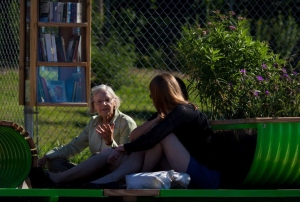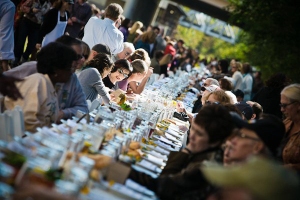 The word “conversation” has, of late, been diluted and diminished through overuse in a variety of contexts and activities that have less and less relevance to authentic, meaningful engagements capable of prompting genuine transformation (more on that complaint in another post). It is refreshing to see conversation featuring more prominently in discussions around community dynamics and community building. One such example was Alec Appelbaum’s article in the New York Times, Techs and the City. While he applauds the utility and efficiency of Big Data and associated technologies to enhance the messy, costly, dismaying aspects of the urban experience, he points out that community is constructed out of, and nurtured by, human relationships. As Appelbaum says, “The point is not that software is useless. But like anything else in a city, it’s only as useful as its ability to facilitate the messy clash of real human beings and their myriad interests and opinions.”
The word “conversation” has, of late, been diluted and diminished through overuse in a variety of contexts and activities that have less and less relevance to authentic, meaningful engagements capable of prompting genuine transformation (more on that complaint in another post). It is refreshing to see conversation featuring more prominently in discussions around community dynamics and community building. One such example was Alec Appelbaum’s article in the New York Times, Techs and the City. While he applauds the utility and efficiency of Big Data and associated technologies to enhance the messy, costly, dismaying aspects of the urban experience, he points out that community is constructed out of, and nurtured by, human relationships. As Appelbaum says, “The point is not that software is useless. But like anything else in a city, it’s only as useful as its ability to facilitate the messy clash of real human beings and their myriad interests and opinions.”
This article caught my interest as I am just concluding Peter Block’s book, “Community: The Structure of Belonging.” One of the key points I am taking away from Block’s work is the simple truth that the mere act of conversational engagement is an act of community building. Without making light of such a serious experience, merely inviting people to engage, be given voice and to be able to commit to a possible future is an extremely powerful act of coming together.
 The importance of personalizing community cannot be overstated. Block quotes Mike Butler, police chief of Longmont, Colorado as saying, “For 80% of the calls we receive, people do not need a uniformed officer, they need a neighbor.” I am reminded of a conversation in this one of Fast Company’s so called “Creative Conversations” series between Twitter founders Biz Stone and Evan Williams, and Charlie Rose. Williams said, “There’s a word that comes to mind when I think of the word conversation, and that is engagement. When you’re having a good conversation, you become engaged with that other person. And once you become engaged, you can learn something. That’s difficult to re-create in our business… No one has been able to re-create that online… ” In the interview, Williams acknowledges that social media has created quantity not quality of conversation. No surprise either that many twitter contacts relish Tweetups where followers meet face-to-face and establish a personal connection.
The importance of personalizing community cannot be overstated. Block quotes Mike Butler, police chief of Longmont, Colorado as saying, “For 80% of the calls we receive, people do not need a uniformed officer, they need a neighbor.” I am reminded of a conversation in this one of Fast Company’s so called “Creative Conversations” series between Twitter founders Biz Stone and Evan Williams, and Charlie Rose. Williams said, “There’s a word that comes to mind when I think of the word conversation, and that is engagement. When you’re having a good conversation, you become engaged with that other person. And once you become engaged, you can learn something. That’s difficult to re-create in our business… No one has been able to re-create that online… ” In the interview, Williams acknowledges that social media has created quantity not quality of conversation. No surprise either that many twitter contacts relish Tweetups where followers meet face-to-face and establish a personal connection.
Technology, data parsing and sharing functionality and apps all have incredible utility to improve our lives. What we must guard against, however, is the alluring deceit that these tools can replace community, especially community built upon personal conversations and relationships flowering from them. There is no substitute for engaging our neighbors in conversation if we wish to live into and enjoy our best possible community future.
